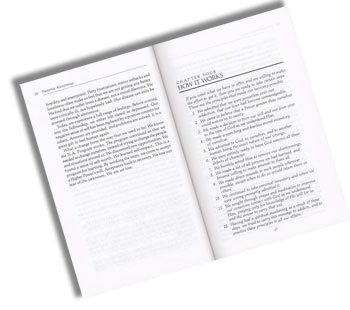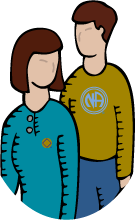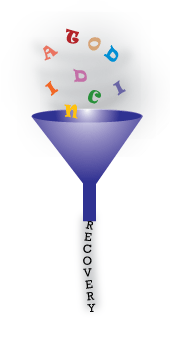 |
|
|
|
Feature When all else fails, read the instructions My first sponsor died suddenly and unexpectedly. In the years since his death, my gratitude for the experience, strength, and hope he passed on to me continues to grow. He always said, “When all else fails, read the instructions.” Every time I am troubled, I reach for our Basic Text, and it always helps me put things in perspective. My sponsor and other recovering addicts who influence me sincerely believe that addicts can leave behind their fear-driven, pain-filled lives to find freedom from active addiction and a spiritual awakening. They constantly guide me to NA literature and passages of the Basic Text. My sponsor called the Basic Text “The Recovery Manual.” I am grateful I have access to a Basic Text and other NA literature in a language I understand. There are many addicts who don’t yet have that chance. When I think of this, the reality of NA’s vision hits me. Our vision looks forward to the day when “every addict in the world has the chance to experience our message in his or her own language and culture.” (NA World Services Vision Statement) Often, in my daily meditation, the power of this vision sweeps over me. I can be reduced to tears of gratitude for the life I have found through working the Twelve Steps of NA, and for those who cared enough to work in service and carry NA’s message to me.
With so much pain among us, there will always be conflict. Many times, simple misunderstandings have grown into grave conflicts entirely disproportionate to the original issues. In “The Recovery Manual,” the essay on the Second Tradition says, “By nature, we are strong-willed, self-centered people who are thrust together in NA. We are mismanagers and not one of us is capable of consistently making good decisions.” (Basic Text, p. 60) So, how do we “mismanagers” manage to work together? In the Introduction to the Basic Text, the addicts who wrote and compiled material for our book offer some suggestions. We can consciously and deliberately invite a Power greater than ourselves into our work, and ask a loving God to influence our decisions. By relying on a loving God, we have a defense against anger, personal opinion, and ego. We can disagree without being disagreeable, and we can conduct our service in a businesslike fashion. By practicing willingness to achieve conscious contact with a Power greater than ourselves, we develop the capacity to recognize the difference between group opinion, as dictated by powerful personalities or popularity, and group conscience. I have a strong personality, but I’ve never been that popular. I am not capable of consistently practicing spiritual principles in all my affairs. I am an addict trying to recover. I pray for progress rather than perfection. Through years of practicing these principles, our fellowship has developed practical guidelines to help addicts like me who wish to find a new way of life and follow the NA way. So, when all else fails, I phone my sponsor, get to a meeting, and read the instructions. Francis M, Belfast, Ireland
Five relapses I came to NA for the first time because my family demanded that I join the program. I relapsed five times in a period of one and one-half years. After the fifth relapse, I arrived at a meeting and my fellow members were still waiting for me. That day, I felt something different, and I decided to stay in NA. On that day, in that room, with those addicts, my desire to stop using was born in me. Alfredo D, Sonora, Mexico
Sharing No matter what The newspaper headline cried out, “Five Hurt As Bus Crashes Into Terminal.” The article went on to explain that an arriving bus had smashed through the glass wall of Long Island’s main bus terminal, injuring five people, one of them critically. A forty-eight-year-old woman lost both legs in the accident. One witness described it like this: “The bus did not stop. In a split second, the glass was flying, and I saw blood. There was a lot of screaming and chaos. There was a woman down, and her leg was gone. All of a sudden, it was quiet, and people started helping.”
We brought NA meetings to her in the hospital. The hospital staff could hardly believe the steady parade of people who came to visit their patient on a daily basis. Only eighteen days after her horrific accident, the nurses’ jaws dropped and their eyes popped when more than fifty NA members showed up at the hospital to celebrate their friend’s four-year NA anniversary. Some had never met her, but they came just to let her know they cared. They heard about her courage and strength, her sense of humor, her belief in NA, and her faith in the principles of the program. That afternoon, as visitors began arriving in groups of two or three, the hospital nursing staff at first allowed only a few visitors at a time in her room. After twenty or so NA members showed up, the staff moved her to a larger space. Eventually, so many NA members showed up that the nurses couldn’t figure out what to do with everybody. One nurse found an empty hallway where fifty or so NA members could sit on the floor while another nurse rolled the patient’s chair down the hall for a very special NA celebration. We invited the nursing staff to sit in on the NA meeting, and they shed tears side-by-side with many NA members. There was hardly a dry eye in the house, and the tissues were working overtime that night. That meeting not only touched the hearts of our members, it also touched the hearts and minds of the hospital staff. For the members, the NA message of recovery was carried that night, perhaps in a way that addicts here hadn’t ever seen or felt before. For the hospital staff, it was the ultimate NA public relations message.
Recently, this dear woman was a speaker at our area convention. Yes, she remained clean through it all. A few months ago, she celebrated seven years clean. She is one of my heroes: an inspiration, a role model, and a reminder of what we can achieve with the help of the NA program and the people in this fellowship. Yes, anything can happen at any time and change our lives in an instant, but we really don’t have to use, no matter what. Richie S, New York, USA What’s your message? Each issue of the Inside Connection Newsletter of the American River ASC (California, USA) includes a question of the month. Here’s a selection of responses to the question, “What message do you most like to share with newcomers today?” Breathe—it gets easier. Garren B v v v
There is always hope, even though it may seem distant at times. Alan and Karen v v v From this day forward, you are making a choice: either to live in the problem, or to live in the solution. There is a solution to every problem, and getting loaded doesn’t solve anything. Steve C v v v Don’t overestimate your nuisance value! In other words, ignore the feeling that you will be bothering someone when you call them.It will help them as much as it will help you! Mike G v v v Keep an open mind. Stop fighting the addiction, and surrender. You don’t have to do it alone. Kathy G v v v If you are like me when I was new—scared, nervous, beaten-down, and tired—you’ll have to trust the program. It has changed my life. If you do what is suggested, you can have a better life. Lishia R v v v Through working the steps, we are able to make peace with our past and learn to love ourselves. Ramon P v v v Doing things a different way can be scary and uncomfortable, but these feelings will go away over time, and you will see the benefits of living clean. Jonnie Reprinted with permission fromInside Connection Newsletter, California, USA
I still remember the first time I realized I wanted to be just like my older brother. At the time, I was ten years old, and he was fifteen years my senior. I was like a formless sculpture, waiting to be molded into anything other than what I was. One weekend, my mother went out of town, so I spent the weekend with my brother and discovered a world that I had not seen before in my sheltered existence. I would be invented that weekend, and everything I did for the next several years was a direct result of that occurrence. His apartment was a small one-bedroom, full of beer bottles and pornographic magazines. It was heaven as far as I was concerned. He and his friends smoked cigars, drank beer, and snorted something that looked like sugar up their noses. They all laughed hysterically and had a fabulous time. I was desperate for that feeling, so every chance I got I would sneak into the bathroom and imbibe a beer. The euphoria I shared with them was perhaps the first experience I ever had where I felt like I belonged. From then on, emulating my brother and re-creating that feeling was my purpose. I accomplished this by using drugs to change the way I felt. After a few years of this behavior and some problems with the local youth authority, my mother moved us to another state. I no longer had my brother to look up to, and had no friends to replace my hero, so I did what had become natural to me: I got loaded. I soon had lots of friends, and we partied on the weekends just like my brother did. It wasn’t long before the weekends turned into weekdays, and the euphoric feeling I once had was all but gone. I missed my brother, my hero, but it would be years before we would see each other again. When my brother came to Oregon, where we had moved, it was not to visit. He had nowhere else to go. He was frail and the years had not been kind to him. I was using drugs every day and was eager to party with my brother again, but something was different. The years of abuse had made him ill and he could no longer function while using, but that did not stop him from being my hero. He used to the point of unconsciousness. He often urinated on himself, and he embarrassed me every time he used. It became easy for me to make a joke of him so that I did not have to look at myself and what I had become. I dismissed him as my hero just as quickly as I had made him so. Seeing my brother in his dilapidated state gave me a vision of my own future. I needed to stop using, but I didn’t know how, and I was becoming desperate. My mental and physical condition was deteriorating rapidly. The pain of remaining the same finally became greater than my fear of change, and I sought help. After a period of abstinence, my life began to change. I came to respect myself and I gained a sense of dignity and integrity. My brother, however, continued to abuse himself, and he nearly died more than once. I wanted to help him, but I knew he had to want to help himself. After I had been clean for three years, my brother started noticing the change recovery had brought to me, and he wanted that for himself. He tried many times to stop, but was not successful. I finally gave him the number of a treatment facility, and told him that if he wanted to stop using I would walk through hell with him—but if he wanted to continue using, he would have to walk through hell alone. To my surprise and joy, he stopped using, and he is still in recovery today. My brother tells me every day that he looks up to me and that I am his hero. As much as I would like to take credit for this, I know I am no hero. It is the program of Narcotics Anonymous that gets the credit for my brother’s new attitude of gratitude and hope. It was the life that NA had given me that attracted my brother to recovery. Neal P, Oregon, USA
|
| Contact NA World Services |
|
Return to Home Page |





